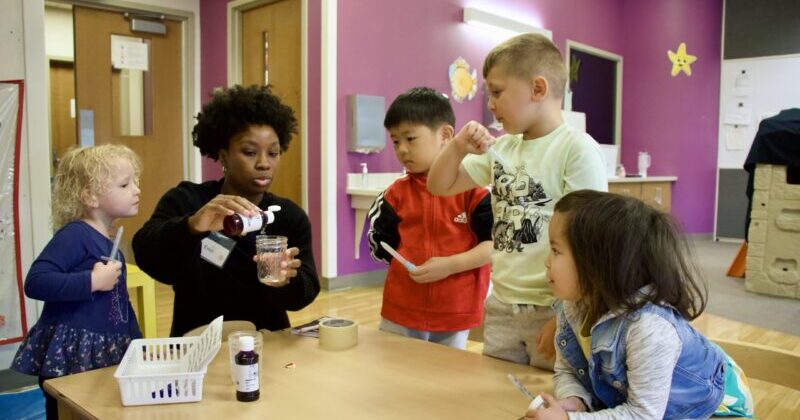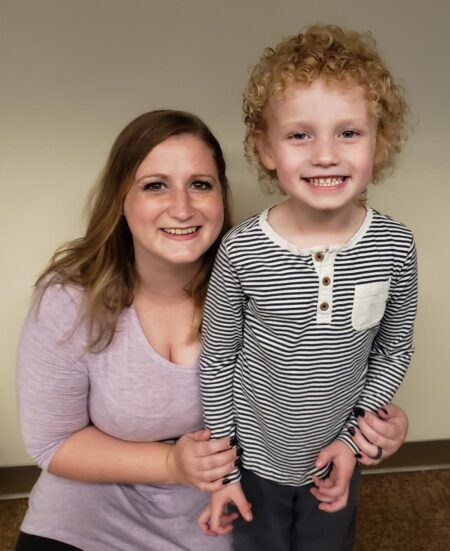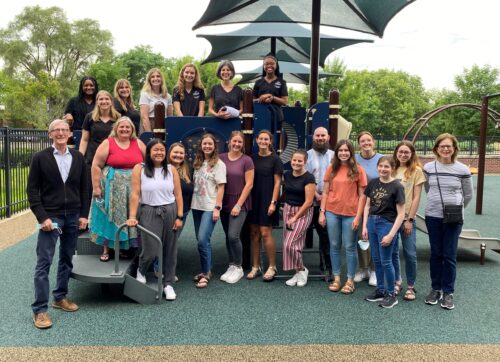Purdue Summer Fun program shapes understanding, treatment of developmental language disorder
Written By: Rebecca Hoffa, rhoffa@purdue.edu

The Summer Fun program is centered around fun, play-based activities that focus on language.(Tim Brouk)
When she noticed her son was having language difficulties, struggling to put words in the right order, Stephanie Bowers began seeking opportunities and programs to help him. It was through speech-language pathologist and Purdue University alumna Belle Underwood at Greater Lafayette Area Special Services, that she heard about the Summer Fun program in the Department of Speech, Language, and Hearing Sciences.
Bowers, who works at Purdue as an intercultural learning specialist in the Office of International Students and Scholars, was interested in the idea of her son not only getting the clinical assistance he needed but also contributing to research to help other children like him who are experiencing language learning challenges because of developmental language disorder (DLD).
“We thought it was a great opportunity to have him continue at least some part of language therapy over the summer, and we fell in love with it,” Bowers said. “It’s such a unique program, and Purdue has such a great speech, language and hearing sciences department.”

Stephanie Bowers (left) poses with her son.(Photo provided)
DLD results when a child shows a weakness in acquiring language without any obvious cause, such as hearing impairments or neurological disorders. Children with DLD often have symptoms such as learning new words at a slow pace, challenges with making proper word combinations, and using short “telegraphic” sentences with small grammatical details omitted. They may also have difficulty pronouncing sounds correctly.
The Summer Fun program is comprised of children ages 4 to 5 who have undergone initial screenings that indicate they have developmental language disorder. The program spans 12 sessions over the course of four weeks and is centered around fun, play-based activities that focus on language. The children’s time is split between research activities and clinical therapy during each session.
The research activities use technology, toys and books to make the time engaging for preschool-age children. Likewise, the clinical component is divided into individual therapy and group therapy, allowing children to excel in their individual language goals while also completing experiential activities with other children.
“It’s a great introduction for socialization and being able to find extra ways to have fun while learning language,” Bowers said. “It’s not all heavy research. They will do little research assignments, but then they get to pick from a treasure box, so my son always loved going in for the research parts.”
The program also benefits students in the College of Health and Human Sciences across both the research and clinical side. Undergraduate students often assist with the research, and graduate student clinicians in the No. 3-ranked speech-language pathology program provide the therapy services under the supervision of a faculty member.

The Summer Fun program focuses on children ages 4-5 with developmental language disorder, which results when a child shows a weakness in acquiring language without any obvious cause.(Tim Brouk)
The Summer Fun program was started in 1997 by distinguished professor Laurence Leonard, director of the Child Language Research Laboratory, together with colleagues in the Department of Speech, Language, and Hearing Sciences. The program was designed to elevate the Child Language Research Laboratory’s research.
Because DLD can be difficult for family members to identify right away and the lab is operating solely within the Greater Lafayette community, Leonard noted it can be challenging to recruit many children with DLD in the age range they’re seeking without the help of the Summer Fun program, during which they see the bulk of their research participants. The program provides a more flexible, mutually beneficial opportunity for parents to bring their children to the lab than they might otherwise have during the school year.
“This is really an underserved population,” Leonard said. “You have to be a little more fine-tuned to recognize the language difficulties that they’re having. For many kids, it’s a pretty longstanding problem, and so the earlier the children can be seen and have language enrichment and language treatment as needed, the better. These children are at risk for having reading difficulties because so much of reading has a language base.”
DLD is very common and affects roughly two children in every classroom, according to the national organization DLD and Me. Patricia Deevy, research associate in the Child Language Research Laboratory, coordinates the research component of the program each year and has seen the program help facilitate many research studies over the last 26 years.
“(Families) are contributing greatly to the advancement of our understanding of this disorder,” Deevy said. “We’ve accomplished a lot in that way.”

The students, faculty and staff who led the 2023 Summer Fun program pose for a photo.(Photo provided)
Ultimately, clinical assistant professor Anne Gritt, who supervises the clinical aspect of the Summer Fun Program, said the program’s influence extends well beyond the department, shaping the Greater Lafayette community as well as speech-language pathologists who graduate from Purdue.
“Summer is a time where it’s harder to get therapy services because schools are out of session, so it fills some of that gap for the children who need those therapy services,” Gritt said. “It’s a short period of time, but there’s so much progress and growth in the graduate student clinicians as well as in the children, so being able to see that progress is my favorite part of the program.”
For Bowers and her family, the program has made all the difference. After completing Summer Fun, they have even continued with the department’s Preschool Language Program during the school year.
“I saw amazing progress in my son from where he was, and I thought he was doing great already, and then to see where he is now, that is 100% thanks to Summer Fun and continuing with the Preschool Language Program,” Bowers said.
The Summer Fun program begins recruiting each February. Families interested in registering for the Summer Fun program should contact Patricia Deevy at deevy@purdue.edu.